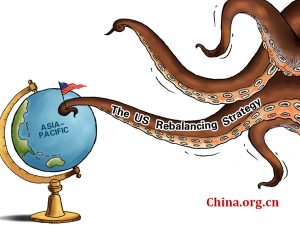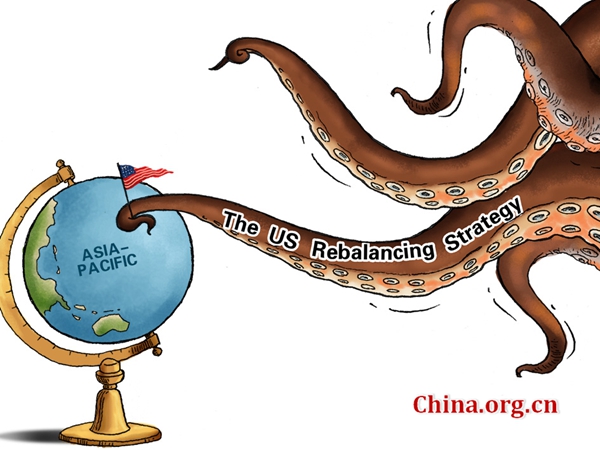 By Caleb T. Maupin
By Caleb T. Maupin
|
|
|
Long tentacles [By Zhai Haijun / China.org.cn] |
When discussing international hypocrisy, analysts often make reference to “The City of God,” a deeply influential text written by St. Augustine of Hippo, published in the year 426. The often cited text tells of a heated exchange between Alexander the Great and a pirate. After being apprehended, the sea robber is said to have rebuked the Greek Emperor saying: “What thou meanest by seizing the whole earth; but because I do it with a petty ship, I am called a robber, whilst thou who dost it with a great fleet art styled emperor.”
This fable regarding the principle of “might makes right” on the high seas should ring loudly in the heads of all who read the 2016 Freedom of Navigation Report from the U.S. Department of Defence.
The United States has not ratified the United Nations Conventions on the Law of the Sea. Since the 1980s, U.S. leaders have maintained that the treaty is a “bad bargain” which hurts American businesses.
Though American representatives participated very closely in the international gathering that composed the treaty, U.S. leaders were unwilling to subject themselves to what was ultimately decided. Despite not signing the treaty, the U.S. Department of Defence still issues an annual Freedom of Navigation report, criticizing nations whose oceanic activities they consider to be inconsistent with the U.N. Convention.
While the 2016 report criticized many different countries, China’s actions were very well highlighted. This narrative regarding China violating “Freedom of Navigation” fits into standard U.S. rhetoric regarding tensions in the South China Sea. China’s increasing naval presence is said to be “aggressive” and “expansionist.”
China’s naval activity shouldn’t be so hard to understand. Prior to 1949, when China was known as the “Sick Man of Asia,” the country had barely any steel production, if any at all. Today, half of the steel in the world is produced in China.
Speaking on the recent anniversary of the Party’s founding, Chinese President Xi Jinping said: “Prosperity for the people is the primary goal of the Communist Party of China, and it is this goal that distinguishes Marxist parties from other political forces.”
Led by the Communist Party, China has made great achievements toward this goal of prosperity. The world tourism industry is reacting to a huge new market, as millions of Chinese families, in poverty just one or two generations before, are now taking international vacations. Economic statistics tell us that each day another Chinese person becomes a millionaire.
Stabilizing the world, securing trade routes
One of the hardships China has always faced in the process of working toward greater prosperity and eliminating poverty is securing access to natural resources. China leads the world in the development of alternative energy, hoping to end the global “oil addiction” which many have condemned. However, China’s industries still require lots of petroleum in order to keep producing and supplying the world with commodities.
While China has some oil domestically, running the vast apparatus of production on the mainland requires imported petroleum. In addition to the land pipelines, most of China’s oil comes by sea, specifically via the South China Sea.
Efforts to secure the routes of oil tankers fit in with China’s overall vision of stabilizing the world, and ensuring peaceful growth and cooperation. China is working to stabilize the Middle East, and to resolve the conflicts in Syria, Iraq, and Yemen. China is cooperating with the Islamic Republic of Iran to build railways through Afghanistan and other countries in Central Asia.
The strategy of “trade and transport” is intended to provide the economic opportunities, reducing the role of heroin traffickers and religious extremists. Much of China’s oil comes from South America, and China has done a great deal to stabilize this region, with the financing of hydro-electrical power plants, schools, hospitals and other necessities.
The safer and more stable the world becomes, the more secure China’s oil imports will be. China’s presence in the South China Sea is not “expansionist” or “aggressive.” It is about protecting the trade routes necessary for ensuring peaceful growth.
Chinese leaders have been very happy to negotiate with nearby countries such as the Philippines. Amid rising tensions, the people of this archipelago nation elected a leader, Rodrigo Duterte, who was determined, not to clash with China, but to resolve the differences.
Freedom of Navigation, most surely means that not only U.S. warships can travel as they please, but that other countries are also able to oversee and protect their vital imports. When U.S. leaders claim to be offended or threatened by actions far away from their shores, which are intended to ensure the safety of trade routes, their motivations must be questioned.
Caleb Maupin is a journalist and political analyst who resides in New York City focusing on U.S. foreign policy and the global system of monopoly capitalism and imperialism.
Opinion articles reflect the views of their authors only, not necessarily those of China.org.cn
http://www.china.org.cn/opinion/2017-03/14/content_40453008.htm




